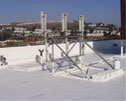When President Obama came into office in early 2009, one of his highest priorities was to pass cap-and-trade energy legislation designed to dramatically reduce carbon dioxide emissions that contribute to global warming. Despite the president's emphasis on this issue, it appears Congress will not pass major energy legislation before it adjourns late this year.
Cap and trade
Energy policy presents opportunities for roofing professionals because the roofing industry can play a significant role in enhancing buildings' energy efficiency and developing renewable sources of energy.
During testimony before Congress in 2009, NRCA Immediate Past President Rob McNamara told lawmakers "providing incentives for building owners to adopt energy-efficient and energy-generating roof systems will improve energy conservation and help reduce carbon emissions."
McNamara urged Congress to pass legislation containing market-oriented solutions and incentives that balance energy and environmental goals with economic concerns, including the Green Roofing Energy Efficiency Tax Act (H.R. 426), a bill supported by NRCA that is designed to accelerate demand for energy-efficient roof systems on commercial buildings.
In 2009, it appeared lawmakers might enact a major energy bill during this Congress. In June, the House approved the Clean Energy and Security Act (H.R. 2454), also known as cap-and-trade legislation. Although the legislation passed the House, it did so narrowly with a vote that was largely along party lines. Many lawmakers were concerned the complex program the legislation creates would lead to dramatically increased energy prices.
NRCA opposed H.R. 2454 because of concerns regarding a cap-and-trade system's potential negative effects on the construction industry and U.S. economy, especially during a time of weak economic growth and high unemployment. One study by the U.S. Chamber of Commerce concluded the bill would create 397 new regulations and 1,060 new government mandates. Additionally, the bill's provisions to accelerate energy efficiency through a national building code may not be practical and could disrupt the construction industry.
H.R. 2454 has languished in the Senate because of opposition from most Republicans and a significant number of Democrats. After months of extensive, unsuccessful efforts by senators to draft an alternative version of cap-and-trade legislation that could garner the 60 votes needed for passage, it has become clear this approach does not have sufficient support in the Senate.
Unable to obtain the votes needed to pass a cap-and-trade bill, several senators pushed for a scaled-down version of energy legislation limited to increasing production of renewable energy sources and accelerating efficiency measures to conserve energy. However, numerous Democratic senators will not support a bill that lacks a cap-and-trade program, which they believe is vital to address global warming.
Lawmakers were unable to break this impasse in the Senate during the summer. With the midterm elections in November approaching fast, the outlook for major energy legislation remains in doubt for the remainder of the year.
Opportunity in 2011
With Republicans expected to make major gains in the House and Senate in the mid-term elections, the cap-and-trade approach to energy legislation may be dead for the foreseeable future. However, with a more even balance of Democrats and Republicans in the next Congress, set to convene in January 2011, a real opportunity may emerge for lawmakers to pass bipartisan legislation that addresses many urgent energy issues without adopting the controversial cap-and-trade program. It will take strong leadership from both political parties to make this happen.
NRCA will continue working with Congress to craft energy legislation that provides a role for energy-efficient and energy-producing roofing while balancing economic considerations with our energy and environmental needs.
Duane L. Musser is NRCA's vice president of government affairs.



